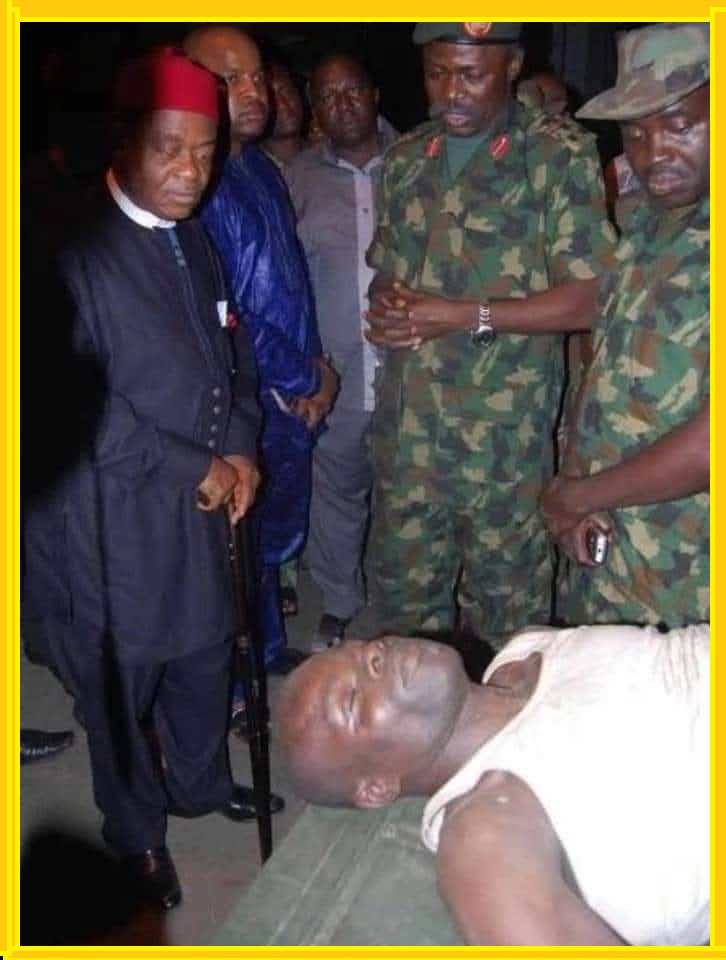Between 2007 and 2010, the city of Aba, the commercial hub of Abia State, was engulfed in terror. Businesses shut down, families fled, and those who remained lived in constant fear. At the center of this chaos was one name—Osisikankwu.
Born Obiọma Nwankwo, Osisikankwu was not just a criminal; he was a nightmare that haunted the streets of Aba, Obigbo (Oyigbo) in Rivers State, and beyond. Leading a gang of over 3,000 men, he turned kidnapping into a lucrative industry, targeting wealthy individuals, expatriates, government officials, and even ordinary citizens who happened to be at the wrong place at the wrong time.
Aba Became a Ghost Town
During this period, Aba felt like a war zone. Fear dictated everyday life, forcing people to abandon their homes in favor of safer spaces like churches. Entire neighborhoods were left deserted—from Ariaria Junction to Umuozuo, Obehi, Ihe, Asa, Ala Oji, St. Mary Catholic Church area, Uratta, and many others, residents packed up and fled for safety.
Kidnappings were an everyday reality. One of the most harrowing cases was that of Chijioke (Igodo), a businessman in Ariaria. When Osisikankwu’s gang came for his older brother, Tochukwu (Igodo), who had just undergone surgery, Chijioke made a heart-wrenching decision—he volunteered to go in his place. His family eventually secured his release, but many others were not as fortunate.
A City Under Siege: No One Was Safe
Osisikankwu’s reign of terror extended beyond Aba. His gang was responsible for the kidnapping of three British nationals and a Colombian engineer from Shell’s Afam VI Power Plant in Rivers State. While ransoms were paid and they were released, the atmosphere of fear persisted.
In 2010 alone, he abducted two Germans, three Chinese nationals, and nine Nigerian workers at the Nigerian Steel Company. High-profile individuals were not spared—Mrs. Victoria Ori, the wife of a wealthy Ohafia businessman, was kidnapped, as were three journalists traveling through Aba after a Nigerian Union of Journalists (NUJ) meeting. Their release came only after a ₦30 million ransom was paid.
The Attack That Shook the Nation
On August 24, 2010, Osisikankwu’s gang, led by a ruthless member known as “Okwute” (Stone), launched coordinated attacks on five banks in the Osisioma area of Aba. Every police officer and security guard on duty was killed.
Religious leaders were not spared. His men kidnapped a senior pastor and brutally murdered an Indian businessman. One of the most devastating incidents was the abduction and murder of Dr. Stanley Uche, a highly respected gynecologist and hospital owner.
But the most horrifying act came on September 27, 2010, when 15 schoolchildren from Abayi International School in Aba were kidnapped. This incident shocked the entire nation, drawing national and international attention to the terror that had gripped Abia State.
Osisikankwu Speaks: A Justification for Violence?
During his reign, Osisikankwu indirectly gave an interview where he attempted to justify his actions. He claimed he was fighting against the marginalization of the Ngwa people, the largest ethnic group in Abia State. According to him, the Ukwa-Ngwa people had been neglected by the government, and his violent activities were meant to bring attention to their plight.
He even suggested that he was open to surrendering if the government agreed to rehabilitate him. But by then, the extent of his crimes had made negotiations impossible.
The End of Osisikankwu: Death in the Evil Forest
The kidnapping of schoolchildren was the final straw. President Goodluck Jonathan ordered the Joint Military Task Force (JTF) to track him down. After weeks of intensive operations, security forces located his hideout in Ugwuati Evil Forest.
The battle was fierce, but in the end, Osisikankwu was killed. His gang scattered, his girlfriend, Ogochi, was arrested, and a massive cache of weapons was recovered.
Aba Could Finally Breathe Again
When the news of Osisikankwu’s death broke, Aba erupted in celebration. Businesses reopened, families returned, and the city slowly regained its commercial vibrance. The grip of fear that had controlled daily life for years finally began to loosen.
Yet, for those who lived through those terrifying years, the scars remain. Families lost loved ones, businesses collapsed, and entire communities were left traumatized.
Were You in Aba During Osisikankwu’s Reign? Share Your Story
If you experienced Aba’s dark days under Osisikankwu’s terror, your story matters. Did you or someone you know encounter his gang? Share your experience in the comments. Let’s ensure that history is not forgotten and that Aba’s resilience is always remembered.
#Osisikankwu#AbaHostage#FearInAba#AbaTerror#MilitantLeadership#IgboHistory#NigeriaTerrorism#AbaCrisis#OsisikankwuLegacy#AbaUnrest#NigerianMilitants#TerrorInAba#IgboMilitants#NigeriaViolence#AbaFear#HostageTactics#OsisikankwuImpact#AbaHistory#AbaReignOfFear#IgboResistanc



